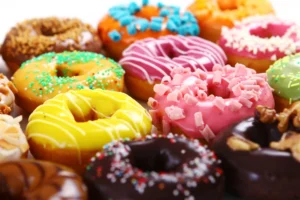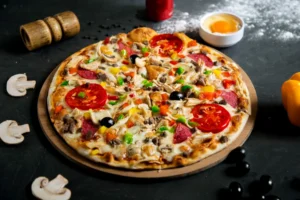“Why does this forbidden chip taste ten times better than the whole bag I just bought?” I remember whispering that to myself after cheekily sneaking a single crisp off my sister’s plate. It wasn’t gourmet. It wasn’t even warm. But somehow, it was divine.
Turns out, I’m not alone. There’s a curious phenomenon many of us have noticed but rarely question: stolen food tastes better. Whether it’s a sneaky forkful off someone’s dessert or nibbling cheese while prepping dinner, the experience feels oddly satisfying. But why?
This article dives deep into the psychology, science, and social context behind this everyday mystery—exploring what makes swiped snacks so irresistible, and what it reveals about our brains, our culture, and ourselves.
It’s Not the Food, It’s the Forbidden
The Forbidden Fruit Effect
There’s a well-documented psychological bias known as “the forbidden fruit effect” — when something is off-limits, it becomes more desirable.
In a 1992 study published in Psychological Science, researchers found that people perceived censored information as more appealing. When we apply that to food, stealing a bite off someone else’s plate might trigger that same allure. The momentary rebellion adds flavour.
“Prohibition increases desire. We want what we can’t have, even if it’s a soggy French fry.” — Dr. Emily Foster, Behavioural Psychologist, University of Sheffield
The Role of Novelty and Surprise
Stealing food is rarely planned. It comes with a dose of spontaneity. This novelty factor activates our brain’s reward system. A 2006 study in Neuron found that dopamine spikes when we encounter unexpected rewards. Translation? That surprise spoonful hits harder than your standard meal.
A Dash of Guilt, A Pinch of Pleasure
Emotional Flavouring: Guilt Enhances Taste
Believe it or not, guilt can enhance taste perception. A study from the University of Southern California in 2014 discovered that participants rated indulgent foods as more enjoyable when they were associated with guilt.
That tiny sense of mischief when sneaking a cookie may prime your brain to extract more pleasure from each bite.
Social Context: Power of Shared (or Unshared) Experience
Food is inherently social. We gauge enjoyment not just by flavour, but by context. When we steal food, there’s often someone nearby who “owns” it. That unspoken tension adds drama to the moment.
“There’s a playful competitiveness to food sharing. When you snag a bite, you’re not just eating; you’re winning.”
— James Tucker, Culinary Anthropologist, University of Cambridge
It’s why chips off someone else’s plate somehow taste more “alive” than the same ones from your bag.
Childhood Conditioning & Nostalgia
Early Sneaks, Deep Imprints
Think back to your earliest food theft. Was it licking cake batter when Mum wasn’t looking? Or fishing out an extra sweet from the jar?
These “mini-rebellions” often trigger nostalgia. The brain ties taste to memory, especially those emotionally charged. This concept is backed by Proustian memory theory, where flavours and smells evoke powerful, emotional recollections.
That cheeky nibble might taste better not because it is, but because it feels like childhood.
Is It Really Better, or Just Perceived That Way?
Sensory Science Weighs In
Some researchers argue the difference is purely perceptual. The placebo effect, long studied in medicine, applies here too.
“When we expect something to taste amazing—even for irrational reasons—our brain adjusts our sensory experience to match.”
— Dr. Sarah Ellison, Neuroscientist, King’s College London
Stolen food carries expectation, emotion, and thrill. Your brain, eager to validate the risk, may amplify the sensory reward.
The Ethics of Snacking: Harmless Fun or Bad Habit?
Is Stealing Food Playful or Problematic?
For many, it’s a shared joke. For others, it breaches boundaries. While psychology may explain the appeal, social norms often frown on it.
A 2021 YouGov UK poll showed that 57% of Brits admitted to sneaking food off a partner’s plate without asking. But when asked how they’d feel if someone did it to them? Only 22% said they’d be okay with it.
Takeaway: we love stealing food, but we hate having food stolen from us.
Mindful Snacking: A Way Forward
Understanding why stolen food tastes better can help us consciously enjoy our own meals more. Instead of stealing, try recreating the conditions:
- Add a sense of novelty to your meals
- Include unexpected treats
- Eat with others and share bites
Actionable Takeaways: How to Make Food Taste Better (Without Theft)
- Switch It Up: Add surprise to your meals – new ingredients, textures, or presentations.
- Eat with Others: Social settings can elevate taste perception.
- Create Rituals: Add small moments of “mischief” (e.g., dessert before dinner) to trigger emotional engagement.
- Engage Emotionally: Eat mindfully. Recall fond memories. It makes each bite richer.
- Be Playful: Share bites, swap plates, or do blind taste tests. Make eating fun again.
Frequently Asked Questions (FAQs)
Why does stolen food taste better than food I cook myself?
Because of the forbidden fruit effect, emotional triggers like guilt, and the added thrill of spontaneity. These all heighten sensory perception.
Is it psychological or biological?
Primarily psychological, though dopamine and oxytocin (social bonding hormones) may play a role.
Can I trick my brain into thinking food is stolen?
To a degree, yes. Recreate the conditions of novelty, surprise, and play during meals.
Is there scientific evidence for this phenomenon?
Yes. Studies from USC, Neuron, and Psychological Science show guilt, surprise, and expectation influence taste perception.
Final Thoughts
Stolen food isn’t actually tastier in a chemical sense. But in the world of flavour, context is king. From emotional nostalgia to rebellious delight, those small acts of culinary mischief tap into something deeply human.
So, next time you reach for someone else’s chip, pause. Is it the chip, or the thrill that makes it taste so good?
Either way, the answer isn’t just on your tongue—it’s in your brain.
Let’s Hear From You
Have you ever experienced this? What’s the most memorable “food theft” you’ve committed (or suffered)? Share your stories in the comments below—we promise not to report you!
Read Also: How Far Our Sneeze Travels?




